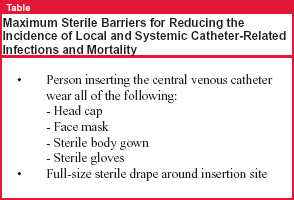Maximum Sterile Barriers for CVC Insertion Save both Money and Lives
Maximum Sterile Barriers for CVC Insertion Save both Money and Lives
Abstract & Commentary
Synopsis: This cost-effectiveness analysis based on available published data suggests that the routine use of maximum sterile barriers for central venous line insertion would reduce the incidence of line-related infections and save both money and lives.
Source: Hu KK, et al. Clin Infect Dis. 2004;39: 1441-1445.
Hu and colleagues at the VA Puget Sound Health Care System in Seattle previously performed a systematic, evidence-based review of the effectiveness of maximum sterile barriers (MSBs) for central venous catheter (CVC) insertion in reducing the incidence of infectious complications, particularly catheter-related bloodstream infections (CR-BSI).1 In the present study, these same investigators performed a cost-effectiveness analysis to determine the economic as well as clinical impact of MSB use in hospitalized patients most at risk for CR-BSI.
Hu et al created a decision-analytic model to assess the outcomes of MSBs vs less-stringent sterile barrier techniques in a hypothetical cohort of hospitalized patients requiring a multi-lumen CVC. This cohort was modeled to represent the types of patients for whom CVCs are most often used in the short term—that is, patients in the ICU, who are immunocompromised, or who receive total parenteral nutrition. Relative risks for local catheter infection, CR-BSI, and death were determined by pooling the data from available studies, and the authors deliberately used conservative estimates for associated costs and mortality.
In this analysis, the use of MSBs lowered costs from $621 to $369 per catheter insertion, and decreased the incidence of local infection (from 5.5% to 2.9%), CR-BSIs (from 5.3% to 2.8%), and death (from 0.8% to 0.4%). Based on these results, the authors estimated that, for every 270 CVCs placed using MSBs instead of a less-rigorous technique, $68,000 would be saved, and 7 episodes of CR-BSI and 1 death would be avoided. They recommend that MSBs be used for all non-emergent CVC insertions in hospitalized patients.
Comment by David J. Pierson, MD
The MSB technique for CVC insertion includes all the components listed in the accompanying table, below. Hu et al estimated the incremental materials cost of using this technique at $15 per line insertion. In addition, on the basis of interviews with physicians at a tertiary-care academic center, a VA hospital, and a community hospital, they estimated that the average additional clinician time it took to adhere to the MSB standard was 20 minutes; however, the range was 2-30 minutes depending on whether the unit stocked the required materials, ideally in an all-inclusive CVC insertion kit. The estimated $40 overall additional cost for using MSB rather than a lesser degree of sterile technique was dramatically overshadowed by the cost savings from a lower incidence of catheter-related infections.

Two other measures for reducing the frequency of CVC-related infectious complications are the use of antimicrobial-impregnated catheters and skin antisepsis with chlorhexidine gluconate solution. Although this area has seen a certain amount of controversy, the current evidence base supports the use of these measures. The combination of these things with MSB technique deserves clinical study, but for now it appears that we should be using them—for both economic and clinical reasons.
Reference
1. Hu KK, et al. Am J Infect Control. 2004;32:142-146.
David J. Pierson, MD, Pulmonary and Critical Care Medicine Harborview Medical Center University of Washington, is Editor for Critical Care Alert.
This cost-effectiveness analysis based on available published data suggests that the routine use of maximum sterile barriers for central venous line insertion would reduce the incidence of line-related infections and save both money and lives.Subscribe Now for Access
You have reached your article limit for the month. We hope you found our articles both enjoyable and insightful. For information on new subscriptions, product trials, alternative billing arrangements or group and site discounts please call 800-688-2421. We look forward to having you as a long-term member of the Relias Media community.
